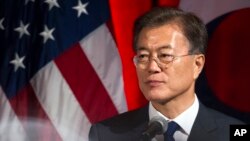South Korean President Moon Jae-in Wednesday defended his country’s free trade agreement with the United States, which U.S. President Donald Trump denounced in the past as a “job killing deal.”
Moon addressed a pro-free trade audience of business leaders and lawmakers at the U.S. Chamber of Commerce on the first day of his presidential visit to Washington. He will meet with Trump at the White House Thursday and Friday.
The South Korean president stressed the 5-year-old U.S.-South Korea free trade agreement (KORUS) has been good for both countries, especially in the auto industry, where now half of all Hyundai and Kia cars are built in the United States.
“South Korea’s carmakers are creating investment and employment in production factories in the U.S. Outstanding U.S. companies are also creating jobs in South Korea in industrial innovation and research and development,” Moon said.
In the last three years, Korean direct foreign investment in the U.S. almost tripled to $40.1 billion, and last year Korean companies in America employed 45,000 people and contributed $138 billion to the U.S. economy, according the American Chamber of Commerce in Korea.
Foreign steel
However Trump has threatened to renegotiate or terminate KORUS for creating a $27 billion U.S. trade deficit with South Korea last year.
A White House official told reporters Trump would raise concerns about “the enormous amount of steel that sometimes ends up being surplus Chinese steel that comes to the United States via South Korea.” The Trump administration is considering whether to impose tariffs or quotas on steel imports.
In April, Trump ordered an investigation under the Trade Expansion Act of 1962 that allows restrictions on imports for reasons of national security. Foreign steel companies have been concerned the investigation may be aimed at shoring up American producers and cutting out foreign competition.
Unfair trade
Trump is also expected to raise unfair trade practices in the auto industry that account for nearly 80 percent of the bilateral trade deficit. The American Chamber of Commerce in Korea faults confusing and difficult to meet environmental and safety standards being imposed by South Korean agencies for the trade imbalance, and has urged the Moon administration to resolve these issues.
“Failure to follow these remedy mechanisms of the KORUS free trade agreement and achieve closure on these outstanding issues puts the entire KORUS free trade agreement at risk,” said David Ruch, United Airlines’ country manager in Korea.
On Wednesday Moon said his government would work to eliminate unfair trade practices.
For the most part Moon focused on the positive side of the economic relationship between South Korea and the U.S. noting, “While world trade has decreased by 12 percent for the last five years due to global economic depression, trade between two countries has increased by 12 percent.”
North Korea
President Moon also stressed economic prosperity on the Korean Peninsula is linked to security. The liberal South Korean leader wants to increase dialogue and economic engagement with the Kim Jong Un government in Pyongyang to peacefully end North Korea’s continued testing and development of nuclear weapons and ballistic missiles.
Reducing regional tensions through outreach and investment, Moon said, will maintain economic stability and create the conditions to improve business ties with North Korea after the nuclear issue is resolved.
“During the process of realizing my government’s plan, you will be able to invest in Korea with no concerns. And furthermore, you could also gain an opportunity to invest in North Korea at some point in the future,” he said.
Moon also supports strong military deterrence and sanctions, and has said his pro-outreach polices are in line with Washington’s “maximum pressure and maximum engagement” policy on North Korea and Trump’s comments that he would be willing to meet with Kim Jong Un over hamburgers. But Trump’s foreign policy team has emphasized increasing pressure through sanctions and has indicated North Korea must first agree to halt its nuclear program before talks can take place.
Youmi Kim in Seoul contributed to this report.





